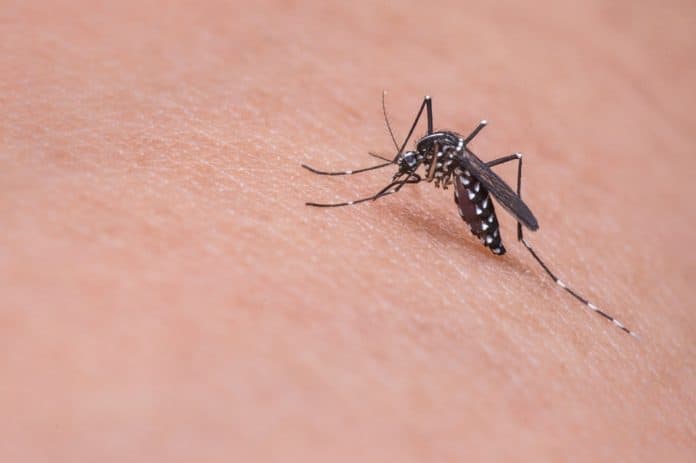
NEW JERSEY – State and county health departments are keeping watch for any reports of Jamestown Canyon Virus (JVC) that emerge following a confirmed case in Sussex County.
A Sussex County man in his 60s tested positive for JCV after an onset of fever and neurological symptoms last month. This is the first detection of this mosquito-borne disease in New Jersey this year and only the second human case of JCV reported in the state (the first case was in 2015, also in Sussex County).
Symptoms
Many illnesses caused by JCV are mild, but moderate-to-severe central nervous system involvement requiring hospitalization have been reported, including fatal infections.
Those infected with mosquito and tickborne diseases may not develop any symptoms, or only develop very mild symptoms. Early symptoms include flu-like illness including fever, muscle aches, headaches, and fatigue, which may be confused with other illnesses, including COVID-19.
Some mosquito and tickborne infections can also cause more serious central nervous system disease, including meningitis or encephalitis (e.g., Eastern Equine Encephalitis, JCV, Powassan, West Nile virus).
Commissioner Persichilli added,“if you or someone you know is experiencing flu-like symptoms, including fever and headache, contact your healthcare provider and let them know if you suspect a mosquito or tickborne illness.”
Along with JCV, Garden State residents are also at risk from other mosquito-borne diseases, including West Nile virus (WNV) and Eastern Equine Encephalitis (EEE), which are generally seen in summer and early fall until mosquitoes are no longer biting.
Prevention
JCV is transmitted by the bite of an infected mosquito and there are no vaccines to prevent JCV and treatment consists of supportive care. The virus has not been detected in mosquitoes yet this season but has been detected in prior years.
“From the protection standpoint, we certainly take all types of potential vector borne illness from mosquitoes and ticks that are prevalent in our region – which are the two of the biggest carriers of disease,” Ocean County Health Department Chief of Administrative Services/Public Information Brian Lippai said.
He added, “people should be vigilant of their surroundings and plan to protect themselves when enjoying the outdoors especially in and around wooded/tall grass areas (ticks) and areas that hold standing water – the place mosquitoes breed.”
Lippai noted that “the weather moving forward this summer will also dictate our mosquito season. More rain can lead to more standing water and better breeding opportunities.”
Health Commissioner Judith Persichilli said “spending time outdoors, whether walking, gardening, or playing with our dogs, is a good way to maintain physical and mental health, but it is important to take steps to prevent mosquito and tick bites, which are responsible for several diseases in New Jersey.
“When enjoying the outdoors, remember to use an EPA-registered insect repellent, cover skin with clothing when you can, and check yourself and your pets for ticks and quickly remove them with tweezers,” Persichilli said.
NJ Department of Environmental Protection Commissioner Shawn M. LaTourette said his agency’s Office of Mosquito Control and Coordination works closely with the DOH and county mosquito control agencies to monitor and reduce mosquito populations and limit potential public health risks as much as possible.
“New Jersey residents can help to reduce these risks by taking steps to eliminate standing water on the grounds of their homes and businesses. Checking flowerpots, pet food and water dishes, birdbaths, swimming pool covers and other places that hold water can significantly reduce the risk of mosquito bites and the illnesses they can carry. Having taken these steps, if you still notice a mosquito problem around your home, reach out to your county mosquito control program for assistance,” LaTourette said.
As people are susceptible to mosquito-borne disease, they can also cause severe illness and death in horses. “The Department of Agriculture encourages animal owners to be vigilant in vaccinating their animals against diseases spread by mosquitoes. Vaccinated animals are much less likely to contract deadly diseases such as Eastern Equine encephalitis and West Nile virus,” Secretary of Agriculture Douglas Fisher said.
Preventative steps you can take concerning mosquito and tickborne diseases include:
- Wear EPA-registered insect repellant when outdoors and wear protective clothing (long sleeves and pants). Light-colored clothing helps you spot ticks! Cover crib, stroller and baby carriers with mosquito netting.
- Avoid being outdoors during dawn and dusk when mosquitos are most active.
- Shower as soon as possible after spending time outdoors and wash and dry your clothing. Tumbling clothes in a dryer on high heat for 10 minutes will kill ticks on dry clothing (damp clothes may need more time).
- Check for ticks frequently and at least daily, on you and your pets. Ticks can hide under the armpits, behind the knees, in the hair, and in the groin. Early removal of ticks (with tweezers) can reduce the risk of infection.
- When in tick-infested areas, walk in the center of trails to avoid contact with overgrown grass, brush, and leaf litter at trail edges.
- Treat clothing with permethrin, ideal for persons who hike or spend a lot of time outdoors.
- Monitor your health closely after a tick bite and during mosquito season and be alert for symptoms of illness. Contact your healthcare provider to discuss testing and treatment.
- Repair holes in screens to keep mosquitoes outside and use air conditioning when possible.
- Reduce areas where hosts for ticks, such as rodents and deer, can congregate to eat, sleep or feed.
- Trim weeds and tall grasses that can provide an outdoor home for ticks.
- Empty standing water at least once or twice a week from flowerpots, pet dishes, birdbaths, swimming pool covers, buckets, barrels, cans, etc.
- Drill holes in the bottom and elevate recycling and other containers if left outdoors. Turn over plastic wading pools and wheelbarrows when not in use.
- Repair and clean storm-damaged roof gutters, particularly if leaves from surrounding trees tend to clog drains. Roof gutters can produce millions of mosquitoes each season!
- Aerate ornamental pools or stock them with fish. Water gardens become major mosquito producers if they stagnate!
- Clean and chlorinate swimming pools, including when not in use.
- Protect your pets by using tick prevention medications and/or vaccines as advised by a veterinarian. Remember – your pets can bring ticks indoors!
- Vaccinate your horses against Eastern Equine Encephalitis and West Nile virus.






